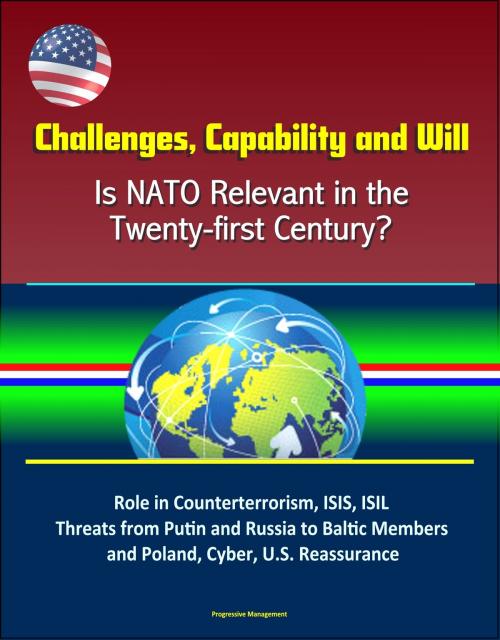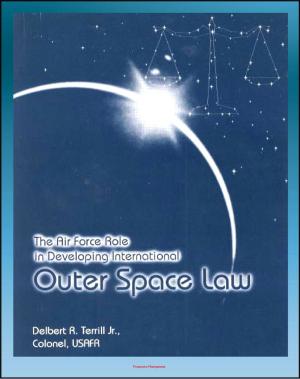Challenges, Capability and Will: Is NATO Relevant in the Twenty-first Century? Role in Counterterrorism, ISIS, ISIL, Threats from Putin and Russia to Baltic Members and Poland, Cyber, U.S. Reassurance
Nonfiction, History, Baltic States, Military, United States| Author: | Progressive Management | ISBN: | 9781370159482 |
| Publisher: | Progressive Management | Publication: | February 22, 2017 |
| Imprint: | Smashwords Edition | Language: | English |
| Author: | Progressive Management |
| ISBN: | 9781370159482 |
| Publisher: | Progressive Management |
| Publication: | February 22, 2017 |
| Imprint: | Smashwords Edition |
| Language: | English |
This excellent report has been professionally converted for accurate flowing-text e-book format reproduction. Since the end of the Cold War NATO has struggled to maintain a raison d'etre for its continued existence and relevance. In the 1990s NATO expanded both its membership and the scope of its operations beyond collective defense. After the terrorist attacks on the US on 11 September 2001, NATO invoked Article Five for the first time. This further expanded NATO operations in location and scope. Now that Russian aggression is threatening the stability of Europe, NATO finds itself in a position to demonstrate its resolve against its former Cold War adversary once again as we move forward into the future. This monograph examines the relevance of NATO in the twenty-first century, particularly from a perspective of US interests within a framework of contemporary history.
After the conclusion of World War II the United States formally rejected a tradition of political and military "nonentanglement with Europe," ending a propensity to distance ourselves from European affairs while fully accepting responsibility as a superpower actor upon the world's stage. What began with ratification of the North Atlantic Treaty and evolved into the North Atlantic Treaty Organization, or NATO, is unparalleled among the landmark actions of United States diplomacy. The Alliance differed from previous security arrangements to address a particular cause, with "permissively worded provisions" and "the deliberate omission of a terminal date" to make the treaty open ended and enduring. Some considered America's first permanent alliance outside the Western Hemisphere, and apparent violation of "George Washington's Great Rule," an extension of the Monroe Doctrine "across the Atlantic to buttress Europe's balance of power." Many hail NATO as "the premier international security institution" and the most successful alliance undertaken in history.4 Whether one agrees or not, one cannot easily dismiss the contributions of NATO to European security during the past sixty-plus years.
Perhaps speaking for many who welcome NATO's commitment to trans-Atlantic security, two statements by recent Allied leaders stress the enduring appeal of the Alliance. During his keynote address at the 2011 Munich Security Conference, then NATO Secretary General Anders Fogh Rasmussen outlined his vision of Smart Defense within NATO. Aptly entitled "Building Security in an Age of Austerity" the Secretary General challenged the Alliance to recognize Smart Defense, "how NATO can help nations to build greater security with fewer resources but more coordination and coherence," as a means to prudently maintain and improve our collective security in a resource constrained environment. Three years later, at the 2014 Munich Security Conference, then Secretary of Defense Chuck Hagel praised NATO as the "centerpiece of transatlantic security," then articulated a "renewed and enhanced" partnership and cooperation with NATO as a fundamental component of the US national security strategy.
This excellent report has been professionally converted for accurate flowing-text e-book format reproduction. Since the end of the Cold War NATO has struggled to maintain a raison d'etre for its continued existence and relevance. In the 1990s NATO expanded both its membership and the scope of its operations beyond collective defense. After the terrorist attacks on the US on 11 September 2001, NATO invoked Article Five for the first time. This further expanded NATO operations in location and scope. Now that Russian aggression is threatening the stability of Europe, NATO finds itself in a position to demonstrate its resolve against its former Cold War adversary once again as we move forward into the future. This monograph examines the relevance of NATO in the twenty-first century, particularly from a perspective of US interests within a framework of contemporary history.
After the conclusion of World War II the United States formally rejected a tradition of political and military "nonentanglement with Europe," ending a propensity to distance ourselves from European affairs while fully accepting responsibility as a superpower actor upon the world's stage. What began with ratification of the North Atlantic Treaty and evolved into the North Atlantic Treaty Organization, or NATO, is unparalleled among the landmark actions of United States diplomacy. The Alliance differed from previous security arrangements to address a particular cause, with "permissively worded provisions" and "the deliberate omission of a terminal date" to make the treaty open ended and enduring. Some considered America's first permanent alliance outside the Western Hemisphere, and apparent violation of "George Washington's Great Rule," an extension of the Monroe Doctrine "across the Atlantic to buttress Europe's balance of power." Many hail NATO as "the premier international security institution" and the most successful alliance undertaken in history.4 Whether one agrees or not, one cannot easily dismiss the contributions of NATO to European security during the past sixty-plus years.
Perhaps speaking for many who welcome NATO's commitment to trans-Atlantic security, two statements by recent Allied leaders stress the enduring appeal of the Alliance. During his keynote address at the 2011 Munich Security Conference, then NATO Secretary General Anders Fogh Rasmussen outlined his vision of Smart Defense within NATO. Aptly entitled "Building Security in an Age of Austerity" the Secretary General challenged the Alliance to recognize Smart Defense, "how NATO can help nations to build greater security with fewer resources but more coordination and coherence," as a means to prudently maintain and improve our collective security in a resource constrained environment. Three years later, at the 2014 Munich Security Conference, then Secretary of Defense Chuck Hagel praised NATO as the "centerpiece of transatlantic security," then articulated a "renewed and enhanced" partnership and cooperation with NATO as a fundamental component of the US national security strategy.















